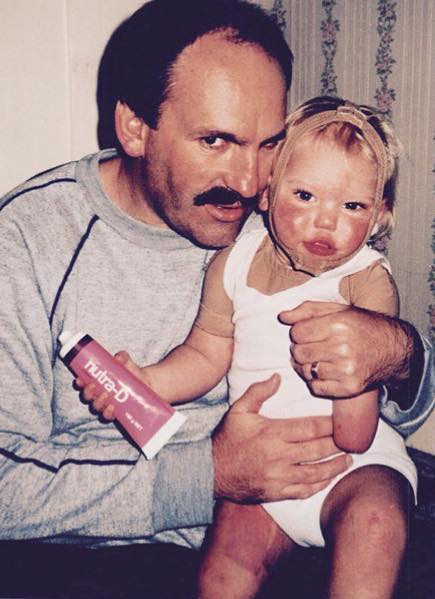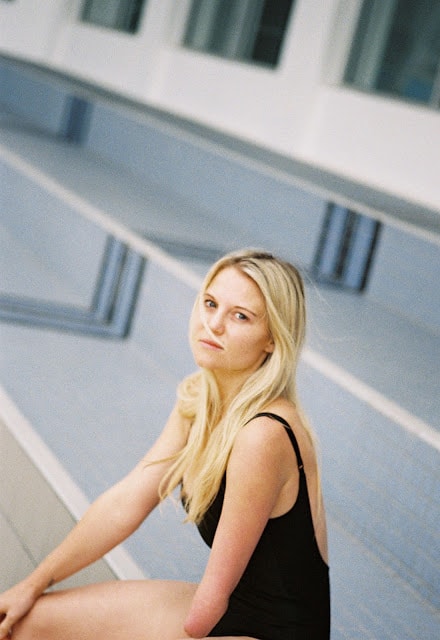Miggy: Jessica, welcome! Thank you so much for agreeing to be interviewed on my blog and for sharing your experience as a congenital amputee, burn victim survivor, Paralympian, and motivational speaker! Let’s jump back to your early childhood–not only were you born “missing” your left arm, but when you were 18 months old you accidentally knocked over a kettle of boiling water and suffered third degree burns on 15% of your body. Wow. Do you remember when you first became aware that you were different from your peers? What did that feel like and how did that shape you? Looking back do you have a different perspective of your childhood and how those years shaped the person you are today?
Jessica: From as far back as I can remember I always knew that I was different. I have vivid memories before I even started school, of feeling very uncomfortable because I didn’t look like other kids. Of course as I got older, and certainly when I reached my teenage years, I became ultra aware of my body and the fact that I didn’t fit societal norms. I grew up in a rural town, there were no other kids with a disability, and I think the lack of diversity that I saw every day, made me even more upset about my own differences. High school can be an awkward time for anyone, but for me, it was unbearable on so many levels. I wanted so much to be ‘normal’ but I wasn’t. I was shy and reserved, because I never wanted to draw attention to myself, yet on the flip-side, I wanted to be recognized – but for something other than my disability and scars. My self esteem and confidence were low, and it therefore became easy for me to use negative language toward myself. On a daily basis I would tell myself how pathetic I was, and how ugly and fat I was. But somewhere deep inside there was also a hint of resilience. I was able to focus my thoughts and feelings on playing sport, and it was swimming that I fell in love with. A sport where I could express myself and the pool was a place where I felt free. I’m now 33, and can honestly say that every aspect of my childhood and teenage years has contributed to the person I am today.

Miggy: Can you tell me what your family life was like growing up? Did you have great support from your parents and siblings? Was there anything you wish they would have done differently?
Jessica: I grew up in a very loving and fun family. I have three younger brothers, and our parents literally provided us all with the most amazing upbringing. Of course growing up is challenging for anyone, but I certainly had moments where I felt jealous of my brothers because to me, their lives were easy. I do remember a time when I was very angry and confused at the world. I had so many questions that I wanted my parents to answer, but they couldn’t.
For example, Why me? Why did I have to be the ‘different’ one.
There was a period of my life when my mum thought it would be best to practice tough love, and by that I mean, she never wanted me to feel sorry for myself or for anyone else to feel sorry for me. So I wasn’t allowed to make excuses for myself. These days I appreciate what she did, it helped build resilience. However, some days I wish she had of just empathized with me more.
As a parent now myself, I understand that all parents do the best they can with the resources they have available to them at the time. My parents did the best they could to help me develop into my own person. One thing I am so very grateful for, is their determination to ensure that I did things for myself. My mum knew when I was young that the world would eventually move beyond pen and paper, so she insisted that I learn to type. And type fast! This is just one example, but basically they made sure I wasn’t going to get left behind, and I’m so grateful for their foresight.
Sometimes though I would have loved a little more empathy, often when I was struggling to do something no one would help me, and although I appreciate the benefits from this, it would have been nice to have felt a little more emotional support when I struggled to do things.
Miggy: You are also a former Paralympic swimmer and represented Australia in the 2004 Paralympics! What did those years as an athlete teach you?
Jessica: Being an elite athlete has taught me so much about life in general. For example I learnt from an early age how to set realistic goals and how to create steps to achieve them. I also learnt how to adapt to new and changing environments while also maintaining motivation. I learnt resilience and I learnt that if I apply my mind to something I can achieve it. These lessons have been invaluable as I navigated my retirement from the pool and into ‘real life’.

Miggy: You’ve also been open with the fact that you battled an eating disorder as a teenager, which (from what I understand) was directly tied to your disability, your burns and how those two things impacted your self-worth. Today you are a motivational speaker and an advocate for positive body image. As you know I have 3 daughters, one with limb differences. While Lamp is a positive and happy child, she is also acutely aware of her differences and her limitations of her body. What is your message for girls, particularly disabled girls, in regards to body acceptance? The disability community is heavily impacted by negative body image, but I never really hear of how we can address this issue within that community specifically. What as a society can we be doing better to improve body image particularly for the disabled community?
Jessica: In recent years my focus has been to broaden our understanding of body image, so as to include more diversity. Body Image is how we think and feel about our appearance, so although it is often linked to beauty, vanity and perfection, it’s actually much more complex than that. It includes race, gender, sexuality, religion, disability and mental health.
I strongly believe that if we start talking about all of these issues from a much younger age, then we will positively influence our children and encourage them to be more accepting overall and I believe that this will directly impact how they see themselves.
Furthermore, there needs to be more representation of people with a disability in main stream media. And I don’t mean just asking a person with a disability about disability. I want to see people with a disability being asked to contribute on issues that impact everyone, such as politics, finances, housing, relationships, education. The sooner we see more people with a disability portrayed in the media as ‘normal’ the sooner our children will start to accept it as well.
My message to young girls is the same, regardless of whether they have a disability or not–self respect first, always. When we respect ourselves and our bodies it is impossible to hate ourselves and focus negatively on our body. The best way for our children to learn about self respect, is to see it in the actions and behaviours of their parents.
Miggy: Now for a lighter question, I’m a big believer in seeing the humor in life and learning to laugh, so have you ever had any funny conversations or moments in your life due to your special needs situations?
Jessica: Having three younger brothers means that every situation involves humour or sarcasm of some sort! I was born missing my left arm, but according to my brothers, that story is ‘boring’. So, they were constantly creating new crazy stories as to why I was missing my arm. Growing up in a very small town meant that rumour spread quickly and almost on a daily basis I would have to answer to people asking questions as to how big the shark was?
I’ve always liked making fun of myself, I think when you can laugh at yourself it takes away awkwardness and pressure.
.jpg)
Miggy: Living with a visible disability comes with unique challenges, in an ideal world how would you like people to approach and/or respond to you? Is there something you wish other people, ie society at large, knew so as to avoid awkward or hurtful situations?
Jessica: I wish people wouldn’t feel embarrassed for themselves or on my behalf. It happens a lot when children are with their parents and say things like “Mummy, that lady only has one arm.” There is absolutely nothing wrong with a child making an observation. It is true, I only have one arm.
But most adults don’t know what to do, so they apologize, or they ‘shh’ their child while grabbing their hand and walking away. These reaction do nothing but tell a child that disability and difference is not OK. It reaffirms the idea that we have to treat people with a disability differently.
Instead, I wish parents would also simply acknowledge what they see, for example:
Child – “Mummy, that lady only has one arm”
Parent – “Yes, she does”
If adults don’t make a big deal about it neither will children. We have to remember that children do what they see us do. Therefore it is up to parents and adults to lead by example.
.jpg)
Miggy: As a mother, what do you think is important for your children and all children to learn about disability and being different?
Jessica: Children need to learn that disability doesn’t mean less than or inferior. Children need to learn that people living with a disability are just as capable of achieving things in their life as able bodied people are.
It’s a cultural change though, and I’m not sure that it will occur in my lifetime, but I’m hopeful that my daughter will witness this shift in her lifetime. But again it comes back to US–we ALL have a responsibility to create change.

.jpg)


Yes, beautiful and important insights about body image and self-love.
Hey These Is alan Our adventure and travel blog is the place we publish our adventures, travel tips & so much more.
mumbai to shirdi taxi